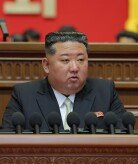Real Intentions Behind Reshuffling
Real Intentions Behind Reshuffling
Posted October. 28, 2006 07:06,
Amidst North Koreas nuclear crisis, Defense Minister Yoon Kwang-ung, Unification Minister Lee Jong-seok, and National Intelligence Service (NIS) director Kim Seung-kyu announced their resignations, and Cheong Wa Dae has dramatically increased the number that makes up the presidential team on Friday despite criticism that it was an inappropriate personnel decision made in disregard of priorities.
President Roh Moo-hyun appointed four special presidential advisers on policy affairs on Friday: Lee Hae-chan, former prime minister, Oh Young-Kyo, former minister of Government Administration and Home Affairs, Cho Young-taek, former head of the Office for Government Policy Coordination and Moon Jae-in, former senior secretary to the president for civil affairs.
In addition, Kim Byong-joon, chairman of the presidential commission on policy planning, was also appointed as a special policy adviser to the president. He will work for both posts.
Those advisors appointed today will launch a special advisory committee to promote dialogue between the government and political parties and will help fine-tune major government policies, said Yoon Tae-young, a spokesman of Cheong Wa Dae.
Consequently, the special advisory team has swelled from three to eight members. The three existing presidential assistants are political advisor Lee Gang-cheol, policy advisor Lee Jung-woo and FTA advisor Han Duck-soo.
Cheong Wa Dae explained that the expansion of the presidential team is to promote dialogue between Cheong Wa Dae and political parties. The ruling Uri Party is, however, seriously discussing dismantling the party with a humiliating defeat in the October 25 by-elections.
Some politicians also point out that Cheong Wa Dae seems to have an ulterior motive in strengthening its policy affairs team in light of the presidential election next year.
The appointment of the new presidential team indicates a department-store like personnel management style of President Roh which is based on code, gratitude, and the revolving-door principle. The real intention behind hiring all advisors with close aides just after the defeat in the recent by-elections is to take an initiative in the political realignment and prepare for the presidential elections, said Na Kyung-won, a spokeswoman for the Grand National Party.
Meanwhile, Kim Seung-kyu had a talk on Thursday with President Roh to express his desire to step down. President Roh agreed to accept his resignation.
Some, however, argue that Kims withdrawal is due to the pressure from the 386 generation politicians. The NIS has been, in fact, investigating the 386 generation on alleged violations of the national security law and spy charges.
In regard to Kims resignation, which was announced not long after Yoon and Lee announced their resignations on Monday and Tuesday, respectively, some experts also point out that President Roh is merely taking makeshift measures that lack a plan for a reshuffling to resolve the North Korean nuclear weapons crisis.
According to sources, Kim Man-bok, deputy chief of the NSI, Minister Yoon, Lee Jong-baek, the head of Seoul High Public Prosecutors Office, as well as Kim Ha-joon, ambassador to China, are strong candidates to succeed Kims seat.
jyw11@donga.com






![한그릇 1만5000원 봄동비빔밥 ‘품절’…제2의 두쫀쿠?[요즘소비]](https://dimg.donga.com/c/138/175/90/1/wps/NEWS/IMAGE/2026/02/27/133437451.3.jpg)
